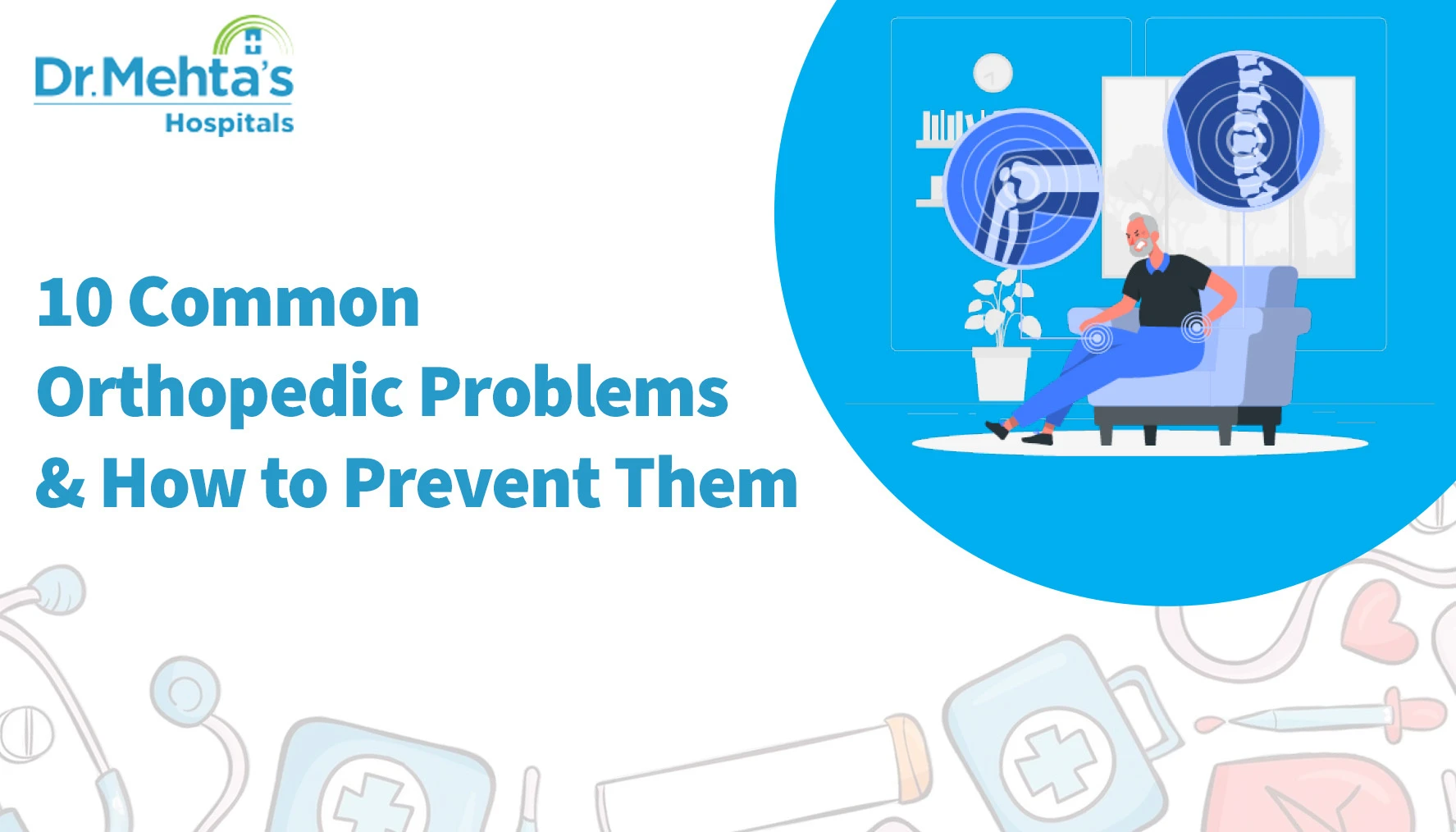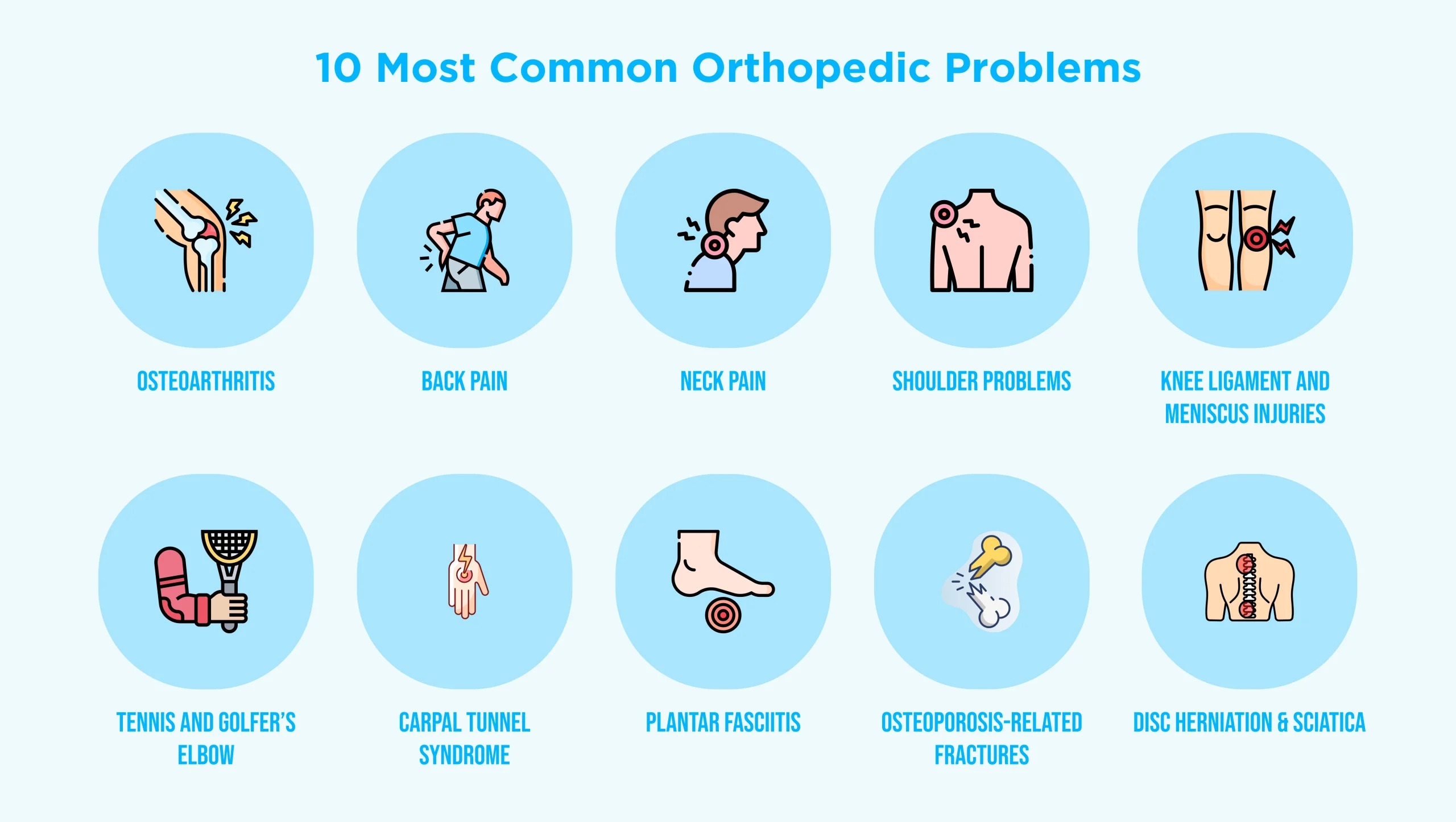Table of Contents

Pain in the knee, back, neck, or shoulder is common, but most can be treated effectively with early intervention.. Have you ever wondered what orthopedic care is and how it can help you? This guide explains the most frequent orthopedic issues, how to avoid them, and when to visit a specialist.
Orthopedics deals with bones, joints, muscles, ligaments, and tendons. Factors that commonly cause orthopedic problems include ageing, poor posture, excess screen time, low physical activity, injuries, and weight gain.
To answer the question, what is an orthopedic doctor? An orthopedic doctor is a specialist who diagnoses and treats conditions ic-related to the bones, joints, muscles, such as sprains, fractures, and arthritis, using medication, therapy, or surgery when required. Early attention helps you stay active and independent.

Bone, joint, and muscle conditions are among the most frequent reasons for doctor visits in India. These issues can affect people of all ages, from everyday aches to long-term conditions like arthritis..
Studies suggest that low back pain is the most common orthopedic issue, affecting nearly one in four individuals (25.9%), followed by tendon and joint attachment disorders (18.3%) and bone fractures (11%).
Early care and prevention can be achieved by understanding what causes these conditions. Here are some of the most common orthopedic problems/issues:
A long-term joint condition in which the cartilage wears down, causing stiffness, swelling, and pain, especially in the knees and hips. It is common in older adults due to natural wear and tear but may worsen with obesity, past injury, or genetics. Osteoarthritis affects around 22–39% of India’s population, with a higher rate among older women.
Pain or stiffness in the lower or middle back caused by muscle strain, disc problems, or poor posture. A sedentary lifestyle, prolonged desk work, and incorrect posture add stress to the spine.
Pain or stiffness in the neck that sometimes spreads to the shoulders or arms. Frequent mobile or computer use, poor sleeping posture, and age-related wear like cervical spondylosis are common triggers.
Injuries like rotator cuff tears, frozen shoulder, or tendon inflammation that cause pain and restrict movement. These occur due to repetitive overhead motions (painting, sports like badminton) or ageing-related tendon wear.
Damage to the knee’s ligaments (like the ACL) or the cushioning cartilage (meniscus). Common in sports, accidents, or physical strain from squatting or running.
Inflammation of the tendons around the elbow joint causing pain and weakness. It develops from repetitive forearm muscle use during sports, typing, or wrist movements.
Compression of the median nerve at the wrist leads to tingling, numbness, or weakness in the hand. It can result from prolonged keyboard use, repetitive wrist motion, or health conditions like diabetes or thyroid disorders.
Inflammation of the plantar fascia (a tissue band under the foot), causing heel pain. Seen in people who stand long hours, wear unsupportive footwear, or are overweight.
Fragile bones that break easily due to reduced bone density, often in the spine, hip, or wrist. More common in elderly women after menopause because of lower calcium and bone density.
A slipped or herniated disc that presses on nerves, leading to back and leg pain. Common causes include ageing discs, improper lifting, or long-term poor posture. For expert evaluation and advanced spine care, you can consult our best orthopedic specialists in Velappancavadi.
Often, yes. Several common orthopedic conditions improve with:
Surgery is considered only when symptoms persist or limit daily function despite non-surgical treatment
Adopt these simple habits to protect your joints and bones:
For guidance, visit our Orthopedics and Physiotherapy Departments at Dr. Mehta’s Hospitals, Chennai.
See a specialist if you experience:
Early consultation helps prevent small problems from turning into major ones.
Meet Our Orthopedic Experts:
Patients trust Dr. Mehta’s Hospitals, one of the best multispeciality hospitals in Chennai, for its advanced orthopedic care and experienced doctors.
The majority of bone and joint problems can be treated with early intervention. Knowing what orthopedic care is and making early choices will keep you pain-free.
Not sure where to begin? Schedule a meeting with our top experienced doctors, and we will customize a plan that suits your objective and life.
FAQs
1) What is orthopedic care in simple words?
Care that focuses on bones, joints, muscles, ligaments, and tendons — including diagnosis, treatment, and prevention.
2) Are all orthopedic problems surgical?
No. Many can be managed with physiotherapy, medication, and lifestyle changes. Surgery is needed only for specific cases.
3) Which activities are safest for joint health?
Walking, cycling, swimming, light strength training, and regular stretching.
4) How do I know if my knee pain is serious?
If pain lasts more than two weeks, or your knee swells, locks, or gives way, see a specialist.
5) Can I exercise with back pain?
Gentle movement helps most people. Start with walking and guided core exercises, and seek medical advice if pain persists.
Table of Contents
Recent Post
About us
Dr. Mehta’s Hospitals is a leading multispecialty hospital in Chennai with over 90 years of excellence. With 400+ beds and 80+ specialties, its Chetpet and Velappanchavadi centers offer advanced, state-of-the-art, compassionate care under one roof.
Chetpet Contact Details
Velappanchavadi Contact Details
Feel free to ask your queries on
Our Specialities
About us
Dr. Mehta’s Hospitals is a leading multispecialty hospital in Chennai with over 90 years of excellence. With 400+ beds and 80+ specialties, its Chetpet and Velappanchavadi centers offer advanced, state-of-the-art, compassionate care under one roof.
Chetpet Contact Details
Velappanchavadi Contact Details
Feel free to ask your queries on
Our Specialities
Quick Links
Center Of Excellence